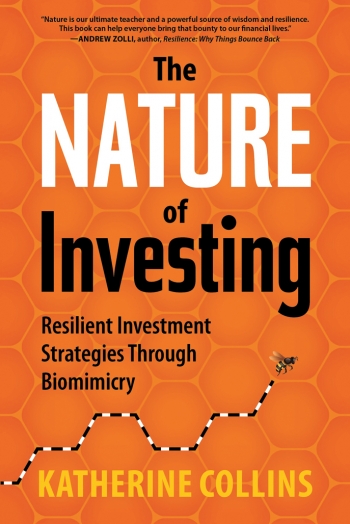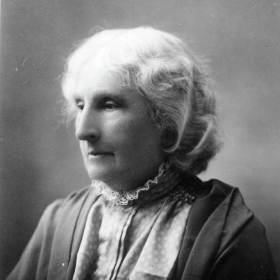What’s the buzz? Katherine Collins ’90, C.E.O. and founder of Honeybee Capital, is changing the landscape of investing with her new book, The Nature of Investing. A seasoned investment professional, Collins was head of US equity research at Fidelity Management and Research Company in Boston, leading one of the largest buy-side research operations in the world. But she was looking for something more. After more than 20 years in the investment industry, she entered Harvard Divinity School, earning a master of theological studies. While there, she took time to reflect on her own investment experience and integrate her expertise into a new way of thinking about how to invest.
The ever-more-sophisticated tools, more complex models, and faster computations in today’s financial markets disconnect investors from what is really important in decision-making, Collins argues. She uses lessons from the study of nature and biomimicry—a framework for creating structures and systems modeled on biological organisms and systems—to forge crucial missing links in the world of investing. Her approach takes the sustainability of nature as its model and seeks to engage investors’ skill, judgment, and values—not just metrics—in the equation.
Throughout the book, Collins offers lessons from nature in how to transform investing from a mechanical, technology-dependent process to a more natural and sustainable one. Everyone is an investor, she reminds readers. People invest their time, energy, and money, and they invest every day as citizens and consumers. She issues a “call to think” challenge to investors to learn from nature’s systems. This involves moving from efficient to effective; from synthetic to simplified; from maximized to optimized; from disconnected to reconnected; from mechanical to mindful; and, from static to dynamic. “When we put them all together, we move our entire system from fragile to resilient, extractive to regenerative, and from disconnected to reconnected,” Collins writes.
What can we learn from the honeybee, which Collins uses as the name of her investment firm? She writes, “First, bees go out into the world to gather data. They leave the hive to see what’s out there in their surrounding environment.” Then, “they come back together and engage in active, objective sharing of information. … They reiterate this process until the information is complete and compelling.” And, most importantly, “bees have a clear, shared common value system. … There are no hidden agendas, no political motives—the bees just want the best answer.”
This is a thought-provoking book, with a simple but profound message—a refreshing reminder to step back, refocus, and … think.
Toh has spent her career in the banking and investment world and is the C.E.O. and cofounder of Abbington Investment Group, LLC, a boutique investment and wealth management firm in McLean, Va.








We ask that those who engage in Wellesley magazine's online community act with honesty, integrity, and respect. (Remember the honor code, alums?) We reserve the right to remove comments by impersonators or comments that are not civil and relevant to the subject at hand. By posting here, you are permitting Wellesley magazine to edit and republish your comment in all media. Please remember that all posts are public.